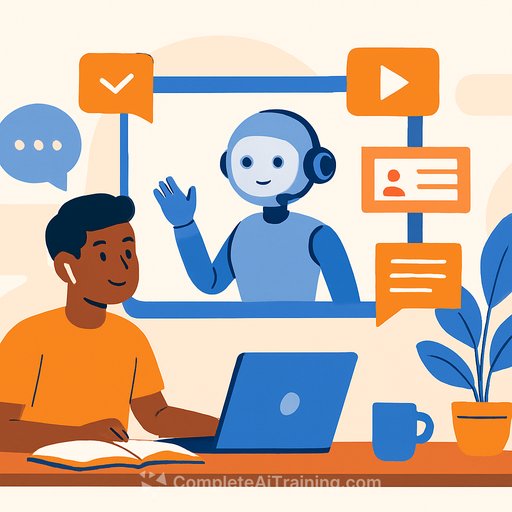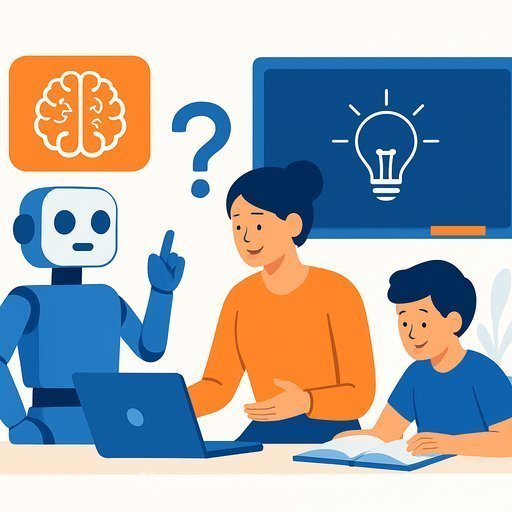How AI Agents Are Changing the Education Sector: A Look at Kira Learning and Beyond
Classrooms are evolving with Artificial Intelligence (AI) becoming an integral part of teaching and learning. AI agents go beyond automating routine tasks — they support teachers in offering personalized guidance and deliver feedback suited to each student’s learning style. Kira Learning is a leading platform in this shift. It applies AI across K-12 education, from lesson planning and grading to tracking student progress. By reducing paperwork, Kira allows teachers to focus more on students’ individual needs. Features like AI tutoring, automatic grading, and smart analytics are helping education move toward a future where learning adapts to every student.
AI Agents Transforming Teaching and Learning
AI agents change how teaching and learning happen by adding personalization, improving effectiveness, and increasing engagement. These digital assistants analyze student data, adjust lessons in real-time, and provide feedback to help learners advance at their own pace. Kira Learning stands out by offering an AI platform that supports both teachers and students throughout the learning process.
Unlike traditional digital tools that just digitize old methods, Kira creates customized lesson plans aligned with curriculum standards. It automates grading and recommends targeted interventions for students needing extra support. The system highlights each student’s strengths and areas for improvement, helping teachers make informed decisions.
Teachers juggle many responsibilities, including lesson planning and administrative paperwork, leaving less time for personalized instruction. Kira handles these tasks, freeing teachers to focus on creative teaching and one-on-one support. Students benefit from adaptive programs that adjust materials to their needs, whether they need extra practice or accelerated content. This approach helps close learning gaps and keeps students motivated.
Other AI platforms, like Squirrel AI and Microsoft Reading Coach, also tailor lessons and feedback based on student performance. However, Kira offers a comprehensive solution from curriculum planning to ongoing assessment and reporting.
AI also makes education more engaging through technologies like Virtual Reality (VR) and Augmented Reality (AR), helping students explore historical sites or study 3D science models. Gamification platforms such as ClassDojo use games and rewards to boost student focus and retention. AI further improves school operations by automating tasks like attendance tracking and participation monitoring. Real-time analytics provide schools with actionable insights to support student success. By reducing administrative workload, AI lets teachers dedicate more time to teaching and personal attention.
As AI becomes standard in classrooms, teacher training is adapting so educators can effectively use these tools and maximize benefits for students. Together, these advancements are making education more personalized, interactive, and efficient, helping both students and teachers thrive.
How Kira Learning is Changing Education with Smart AI Tools
Kira Learning is a next-generation AI platform that does more than traditional learning management systems. Instead of just storing coursework and grades, Kira acts as a smart assistant for teachers. It supports lesson planning, grades assignments automatically, and provides personalized student support, reshaping teaching and learning.
Kira uses advanced AI to build lesson plans by analyzing past student performance, curriculum standards, and learning styles. The lessons it creates meet both class objectives and individual needs.
The platform’s automated grading uses natural language and image processing to quickly and fairly assess diverse assignments, from essays to problem-solving tasks. This saves teachers time and ensures consistent, timely feedback for every student.
One of Kira’s strongest features is real-time, personalized feedback. When students submit work or complete exercises, the AI instantly reviews it, highlights strengths and areas for improvement, and offers clear recommendations. This continuous feedback helps students take control of their learning and advance more quickly.
Kira also compiles comprehensive student data for teachers, showing class-wide patterns and individual progress. Its dashboard identifies engagement trends, knowledge gaps, and performance issues. Predictive analytics spot students at risk of falling behind, enabling timely interventions and fair learning opportunities.
By automating grading, attendance, and lesson customization, Kira reduces teachers’ administrative burden, letting them focus on tailored lessons, mentoring, and curriculum innovation.
Schools using Kira, including districts in Tennessee, report higher student participation, improved assignment completion, and better test scores. Personalized learning pathways ensure every student receives challenges and support suited to their level, making learning more effective and meaningful.
Kira’s cloud-based system integrates smoothly with existing school software and complies with privacy regulations, easing adoption. It continues evolving by incorporating educator feedback and the latest AI advances.
The Architecture Behind Kira Learning
Kira was built from the ground up to deeply integrate AI, making it flexible and scalable for modern education needs. It features several AI agents working together:
- AI Tutor: Adjusts lessons and pacing to match each student’s skills and learning style, creating custom practice questions and providing help in challenging subjects.
- AI Teaching Assistant: Supports teachers in lesson planning based on student data and curriculum requirements.
- AI Grader: Uses language and image processing to quickly assess assignments, including essays and videos, delivering detailed feedback.
- AI Insights Agent: Collects and summarizes classroom and school data, offering reports that help teachers monitor engagement, identify gaps, and improve instruction.
Kira works well with other school software using standard protocols like Learning Tools Interoperability (LTI), Common Cartridge, and OneRoster. This allows schools to adopt Kira fully or integrate its AI features into existing tools. Its modular, cloud-based design serves a single classroom or multiple schools reliably and efficiently. Successful deployments, including state-wide use in Tennessee, demonstrate its adaptability.
Challenges and Considerations of AI in Education
While AI offers many benefits, several challenges require attention.
- Equity and Access: Not all students have equal access to technology. Rural and low-income schools may lack resources to provide AI tools, risking widening learning gaps. Efforts must ensure AI learning tools reach every student regardless of background.
- Data Privacy and Ethics: AI systems collect extensive student data, including personal details and behavior patterns. Schools need strong safeguards to protect this data.
- Bias in AI: If training data is biased, AI systems can make unfair decisions, such as uneven grading. Addressing bias is critical to maintain fairness.
- Teacher Support: AI should assist teachers, not replace them. While it can handle administrative tasks, teachers remain essential for building relationships and guiding students.
The Bottom Line
AI agents are changing education by saving teachers time on grading and planning while delivering learning experiences that fit each student’s needs. Kira Learning illustrates how AI can support educators and learners with smart tools and insightful data. Challenges like equitable access, data privacy, and bias must be managed carefully. Above all, AI should enhance teachers’ work rather than replace their role. With thoughtful use, AI can make education more personal, fair, and effective for everyone.
Your membership also unlocks:






